En toen had Petrus een probleem .
Die Internationale theologen commissie had vast géén vertrouwen in zijn Who is Who? exemplaar
JPII begon al met de aankondiging dat het leeg was,
BXVI vertelde dat het afgeschaft was.
Zomaar na eeuwen dat Limbo afschaffen, ik vond het altijd al hoogst verdacht.
Maar niks afgeschaft. Het moest ontruimd worden, het was nodig maar daarvoor moesten die kinderen er eerst uit.
De vraag is wanneer het Vaticaan dát gaat erkennen...
Beschuldigd van medeplichtigheid aan Argentijnse dictatuur
Kardinaal Pio Laghi overleden
Geplaatst door Theo Borgermans op zondag 11 januari 2009 om 18:10u
ROME (RKnieuws.net) - In een ziekenhuis in Rome is kardinaal Pio Laghi, die van 1974 tot 1980 apostolisch nuntius was in Argentinië, op 86-jarige leeftijd overleden. Hij werd destijds beschuldigd van medeplichtigheid aan de Argentijnse dictatuur.
In 1997 werd klacht tegen de prelaat ingediend bij de Italiaanse justitie, maar zonder gevolg.
’De kardinaal was in zijn relaties met de families nog brutaler dan de militairen zelf’’, verklaarde de moeder van twee verdwenenen.
Kardinaal Laghi verklaarde in 1997 dat hij maar wist wat er gebeurde in het land nadat hij Argentinië verlaten had.
Laghi kon destijds een oorlog tussen Argentinië en Chili over het Beaglekanaal voorkomen. Kardinaal Laghi is ook nuntius in Israël en in de VS geweest. Hij was een persoonlijke vriend van Golda Meir.
In 1990 werd hij benoemd tot prefect van de Congregatie voor Katholieke Opvoeding. Hij bleef die functie vervullen tot 1999. (tb)
As attorneys across the nation press countless clergy sex abuse cases against the church, two critical questions they most often ask are: “What did the bishop know?” and “When did he know it?” At stake is episcopal culpability. Also at stake in thousands of lawsuits, many filed and many others still being planned, is potentially billions of dollars in payments to victims.
In light of these developments, a 92-page report on clergy sex abuse, distributed to the U.S. bishops in May 1985, warning them of the trouble ahead, has been repeatedly cited by victims’ attorneys as a hard measure of episcopal negligence. The document, reportedly referred to in more than 100 lawsuits, is well known to the bishops.
Among the insights in this document are clear statements that while help can be provided for abusive priests, there is “no hope” for a cure for some of them, that a bishop “should suspend immediately” a priest accused of sexual abuse when “the allegation has any possible merit or truth,” and that “In this sophisticated society a media policy of silence implies either necessary secrecy or cover-up.” It said, “clichés such as ‘no comment’ must be cast away.” [Note that the first two quotations are not from the report, but from an essay by one of its authors, Rev. Michael R. Peterson, written in December 1985 to accompany the report when he sent it to the bishops.]
In some ways this is a story of what might have been or, perhaps, what might have been avoided.
As the bishops prepare for their June meeting in Dallas at which they are expected to formulate their responses to the clergy sex abuse scandal, the names of two priests and an attorney, Fr. Michael Peterson, Dominican Fr. Thomas Doyle and Ray Mouton, are likely to haunt them. These are the names of the men who attempted to warn the bishops in 1985, pleading with them to take firm actions on the sex abuse cases.
The authors maintained that the bishops ignored their recommendations. For their part, the bishops deny that claim.
It was in January 1985 that Peterson, then director of St. Luke Institute in Silver Spring, Md.; Doyle, a canonist at the office of the papal nuncio, or pope’s representative, in Washington D.C.; and Mouton, a civil attorney representing a priest, Fr. Gilbert Gauthe, then charged with pedophilia, began their collaboration. The collaboration continued over five months and resulted in the report, backed with more than 100 pages of supporting evidence. The report covered the civil, canonical, and psychological aspects of priest sexual involvement with children.
When the men turned over their findings to the bishops, it might have seemed extreme to some; today it reads as a prophetic document.
The Catholic church, the three men wrote, faces “extremely serious financial consequences” and “significant injury” to its image as a result of the “sexual molestation of children by clerics, priests, permanent deacons and transient deacons, nonordained religious, lay employees and seminarians.”
Postponing the day of reckoning
In Lead Us Not Into Temptation, Jason Berry furnished abundant evidence to explain why critics are so skeptical. Beginning with the case of Father Gilbert Gauthe—who was suspended from priestly duties in the Diocese of Lafayette, Louisiana, after assaulting a number of altar boys—Berry slowly uncovered a pattern of sexual abuse. Still more troublesome, he found that through most of the 1980s, church authorities refused to grapple with the problem directly, instead treating each complaint on a quiet, ad hoc basis. Time after time, diocesan officials—often responding to advice from their lawyers—refused to acknowledge that a problem existed.
While the bishops concentrated on “damage control,” Berry found an oddly mixed triumvirate in individuals pressing for a concerted national effort to grapple with the pedophilia problem. Father Thomas Doyle, OP, was a canon lawyer, assigned to the office of the apostolic pro-nuncio, Archbishop Pio Laghi, in Washington. Ray Mouton was a Louisiana lawyer, who became involved with Gauthe case in Lafayette. Father Michael Peterson was a psychiatrist, specializing in the treatment of troubled clergy, who was dying of AIDS as the scandal unfolded. Together, they pushed the US bishops to recognize the growing problem of sexual abuse, and to set up consistent policies to handle the legal, psychiatric, and pastoral implications of the scandal.
For years their efforts were ignored—or worse. In 1987, Bishop A. James Quinn of Ohio wrote to Archbishop Laghi, complaining that Father Doyle’s public statements on the issue were inflaming public opinion. Others charged that the three would-be reformers were merely looking for consulting contracts. Mark Chopko, the general counsel to the US bishops’ conference, later admitted, “There was a feeling that those guys wanted to set themselves up for work.”
“What explains the deception of bishops confronted with child-molesting priests?” Berry wondered. “What is it in the ecclesiastical mind that reaches out to lawyers rather than parents?”
(Ariel Dorfmann, Testamento)
zondag, januari 18, 2009
Postponing the day of reckoning. Het Limbo en Petrus' Who is Who
Abonneren op:
Reacties posten (Atom)
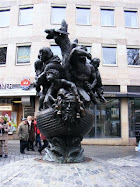
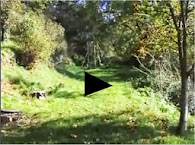
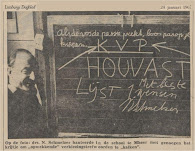

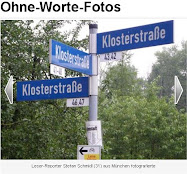
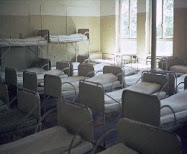





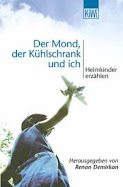
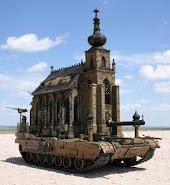
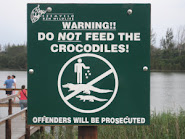

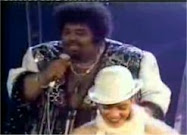
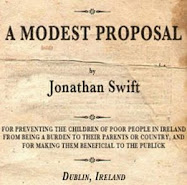


Geen opmerkingen:
Een reactie posten